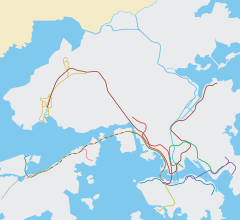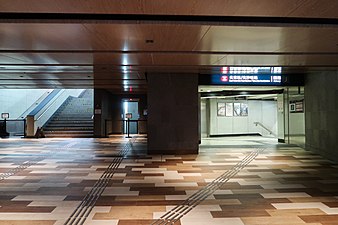East Tsim Sha Tsui station
This article needs additional citations for verification. (June 2016) |
East Tsim Sha Tsui 尖東 | |||||||||||||||||||||||||||||||||||||||||||||||||||||||||||||||||||||||||||||||||||||||||||||||||||||||||
|---|---|---|---|---|---|---|---|---|---|---|---|---|---|---|---|---|---|---|---|---|---|---|---|---|---|---|---|---|---|---|---|---|---|---|---|---|---|---|---|---|---|---|---|---|---|---|---|---|---|---|---|---|---|---|---|---|---|---|---|---|---|---|---|---|---|---|---|---|---|---|---|---|---|---|---|---|---|---|---|---|---|---|---|---|---|---|---|---|---|---|---|---|---|---|---|---|---|---|---|---|---|---|---|---|---|
 Platform 1 in June 2021 | |||||||||||||||||||||||||||||||||||||||||||||||||||||||||||||||||||||||||||||||||||||||||||||||||||||||||
| Chinese name | |||||||||||||||||||||||||||||||||||||||||||||||||||||||||||||||||||||||||||||||||||||||||||||||||||||||||
| Traditional Chinese | 尖東 | ||||||||||||||||||||||||||||||||||||||||||||||||||||||||||||||||||||||||||||||||||||||||||||||||||||||||
| Simplified Chinese | 尖东 | ||||||||||||||||||||||||||||||||||||||||||||||||||||||||||||||||||||||||||||||||||||||||||||||||||||||||
| Cantonese Yale | Jīmdūng | ||||||||||||||||||||||||||||||||||||||||||||||||||||||||||||||||||||||||||||||||||||||||||||||||||||||||
| Literal meaning | Sharp East | ||||||||||||||||||||||||||||||||||||||||||||||||||||||||||||||||||||||||||||||||||||||||||||||||||||||||
| |||||||||||||||||||||||||||||||||||||||||||||||||||||||||||||||||||||||||||||||||||||||||||||||||||||||||
| General information | |||||||||||||||||||||||||||||||||||||||||||||||||||||||||||||||||||||||||||||||||||||||||||||||||||||||||
| Location | Salisbury Road, Chatham Road South × Middle Road, Tsim Sha Tsui Yau Tsim Mong District, Hong Kong | ||||||||||||||||||||||||||||||||||||||||||||||||||||||||||||||||||||||||||||||||||||||||||||||||||||||||
| Coordinates | 22°17′44″N 114°10′31″E / 22.2955°N 114.1754°E | ||||||||||||||||||||||||||||||||||||||||||||||||||||||||||||||||||||||||||||||||||||||||||||||||||||||||
| Owned by | KCR Corporation | ||||||||||||||||||||||||||||||||||||||||||||||||||||||||||||||||||||||||||||||||||||||||||||||||||||||||
| Operated by | MTR Corporation | ||||||||||||||||||||||||||||||||||||||||||||||||||||||||||||||||||||||||||||||||||||||||||||||||||||||||
| Line(s) | Tuen Ma line | ||||||||||||||||||||||||||||||||||||||||||||||||||||||||||||||||||||||||||||||||||||||||||||||||||||||||
| Platforms | 2 (1 island platform) | ||||||||||||||||||||||||||||||||||||||||||||||||||||||||||||||||||||||||||||||||||||||||||||||||||||||||
| Tracks | 2 | ||||||||||||||||||||||||||||||||||||||||||||||||||||||||||||||||||||||||||||||||||||||||||||||||||||||||
| Connections |
| ||||||||||||||||||||||||||||||||||||||||||||||||||||||||||||||||||||||||||||||||||||||||||||||||||||||||
| Construction | |||||||||||||||||||||||||||||||||||||||||||||||||||||||||||||||||||||||||||||||||||||||||||||||||||||||||
| Structure type | Underground | ||||||||||||||||||||||||||||||||||||||||||||||||||||||||||||||||||||||||||||||||||||||||||||||||||||||||
| Accessible | Yes | ||||||||||||||||||||||||||||||||||||||||||||||||||||||||||||||||||||||||||||||||||||||||||||||||||||||||
| Other information | |||||||||||||||||||||||||||||||||||||||||||||||||||||||||||||||||||||||||||||||||||||||||||||||||||||||||
| Station code | ETS | ||||||||||||||||||||||||||||||||||||||||||||||||||||||||||||||||||||||||||||||||||||||||||||||||||||||||
| History | |||||||||||||||||||||||||||||||||||||||||||||||||||||||||||||||||||||||||||||||||||||||||||||||||||||||||
| Opened | 24 October 2004 | ||||||||||||||||||||||||||||||||||||||||||||||||||||||||||||||||||||||||||||||||||||||||||||||||||||||||
| Services | |||||||||||||||||||||||||||||||||||||||||||||||||||||||||||||||||||||||||||||||||||||||||||||||||||||||||
| |||||||||||||||||||||||||||||||||||||||||||||||||||||||||||||||||||||||||||||||||||||||||||||||||||||||||
| Former services | |||||||||||||||||||||||||||||||||||||||||||||||||||||||||||||||||||||||||||||||||||||||||||||||||||||||||
| |||||||||||||||||||||||||||||||||||||||||||||||||||||||||||||||||||||||||||||||||||||||||||||||||||||||||
| |||||||||||||||||||||||||||||||||||||||||||||||||||||||||||||||||||||||||||||||||||||||||||||||||||||||||
| |||||||||||||||||||||||||||||||||||||||||||||||||||||||||||||||||||||||||||||||||||||||||||||||||||||||||
East Tsim Sha Tsui (Chinese: 尖東; Cantonese Yale: Jīmdūng) is a station of the Mass Transit Railway (MTR) system of Hong Kong. It is currently an intermediate station on the Tuen Ma line.
The station was built to alleviate surface traffic jams and passenger congestion at Kowloon Tong station. The distance from Hung Hom to the station is about one kilometre with the journey time of around two minutes.
This station is linked with Tsim Sha Tsui station of the Tsuen Wan line by subways (underground pedestrian tunnels).
History
[edit]The predecessor of the East Rail line was the Kowloon–Canton Railway (British Section), which was opened in 1910. At the time of opening, its southern terminus was the old Kowloon station located in Tsim Sha Tsui, where the Clock Tower stands today. However, the old Kowloon station was closed in 1975, and the southern terminus of the railway was relocated to the newly built Hung Hom station.
An early predecessor to the present East Tsim Sha Tsui station, named Mariner in the East Kowloon line 1970 scheme, was intended to provide interchange to Tsim Sha Tsui of the Kong Kow line (now part of Tsuen Wan line).
Plans for East Tsim Sha Tsui were subsequently revived in 1993 when the plans for East Kowloon line were modified to become a medium-capacity system as part of an Eastern Corridor with transfer to the Lantau Airport Railway (now Airport Express and Tung Chung line). The contract to construct East Tsim Sha Tsui was subsequently awarded to a consortium consisting of Hong Kong-based Gammon Construction and Japan-based Nishimatsu.[1]
East Tsim Sha Tsui was opened on 24 October 2004 as a southward extension of the KCR East Rail from Hung Hom, the Tsim Sha Tsui Extension,[2][3][4][5] symbolising the return of the railway to the Tsim Sha Tsui area after 30 years. It served as the southern terminus of the East Rail line until 16 August 2009. As a result of its underground location, the station was equipped with full-height platform screen doors, of the same type used on the KCR West Rail, which opened the year prior. The station was the only one on the East Rail line with these doors for five years, and as a result, the 12-car-long set of screen doors were the longest in the world.

The status of the East Tsim Sha Tsui station as the southern terminus of the East Rail line was intended to be a temporary arrangement only. Upon the opening of the MTR Kowloon Southern Link on 16 August 2009, the East Rail line terminated in the south at Hung Hom again (albeit only temporary until the opening of Sha Tin to Central Link in 2022), and the tracks between Hung Hom and East Tsim Sha Tsui became part of the West Rail line. As a result, Hung Hom became the common southern terminus of (and provided cross-platform interchange between) the East Rail line and the West Rail line, whilst East Tsim Sha Tsui became an intermediate station on the West Rail line. Due to the shorter length of the Tuen Ma line trains (8 cars), the ends of the platforms were taken out of use and closed off.
On 27 June 2021, the West Rail line officially merged with the Ma On Shan line (which was already extended into the Tuen Ma line Phase 1 at the time) in East Kowloon to form the new Tuen Ma line, as part of the Shatin to Central link project. Hence, East Tsim Sha Tsui was included in the project and is now an intermediate station on the Tuen Ma line.
Station layout
[edit]| Pk/PD | Park/ Podium Deck |
Middle Road Children's Playground, Tsim Sha Tsui East Waterfront Podium Garden |
| G | Ground | Exits/Entrances, East Tsim Sha Tsui Station Transport interchange, Tsim Sha Tsui East (Mody Road) Transport interchange |
| C/S | Concourse | Customer service centres, washrooms shops, vending machines, ATMs |
| Subway | Subway to Tsim Sha Tsui (Tsuen Wan line), Middle Road, Peking Road, Kowloon Park Drive, Canton Road Salisbury Road, Hanoi Road, K11 Art Mall, Nathan Road, Mody Road, Tsim Sha Tsui East | |
| P | Platform 1 | Tuen Ma line towards Tuen Mun (Austin) → |
| Island platform, doors will open on the right | ||
| Platform 2 | ← Tuen Ma line towards Wu Kai Sha (Hung Hom) | |


Passengers heading towards the Tsuen Wan line ride the escalator up to the concourse and leave the Tuen Ma line system. Then they walk along the Middle Road or Mody Road subway system respectively to reach Tsim Sha Tsui station at exits L2 and M3, respectively.[6]
Although the stations are connected by subway, the fare gates for East Tsim Sha Tsui and Tsim Sha Tsui stations are separated. Single journey ticket passengers transferring from the Tuen Ma line to the Tsuen Wan line must purchase a second ticket at Tsim Sha Tsui station as the ticket is withdrawn once the passengers exit through the turnstiles at East Tsim Sha Tsui station. In contrast, Octopus card users who transfer between East Tsim Sha Tsui and Tsim Sha Tsui stations within thirty minutes without making any other transport related purchases or more than nine non-transport related purchases in between stations are considered to have taken a single journey and are charged accordingly. Also, MTR City Saver users who transfer between East Tsim Sha Tsui and Tsim Sha Tsui stations within thirty minutes are considered to have taken a single journey and no extra journey will be charged.[6]
Entrances/exits
[edit]East Tsim Sha Tsui station is linked with Tsim Sha Tsui station through the Mody Road and Middle Road subways. When both stations' exits are combined, the total number of exits outnumber even that of Central. Tsim Sha Tsui station has the exit with the highest letter of all rail stations in Hong Kong.[7]
There's no exits I or O because of the confusion with 1 and 0 respectively.
In Tsim Sha Tsui station
[edit]- A1: Kowloon Park
 [7]
[7] - A2: Humphreys Avenue[7]
- B1: Nathan Road[7]
- B2: Cameron Road[7]
- C1: Nathan Road[7]
- C2: Peking Road[7]
- D1: Nathan Road[7]
- D2: Carnarvon Road[7]
- E: Kowloon Hotel[7]
- H: iSQUARE[7]
- R: iSQUARE[7]
In East Tsim Sha Tsui station
[edit]- J: Victoria Dockside
 [7]
[7] - K: Middle Road
 [7]
[7] - L1: Hermes House[7]
- L3: Peninsula Hotel
 [7]
[7] - L4: Kowloon Hotel[7]
- L5: Peking Road
 [7]
[7] - L6: Salisbury Road
 [7]
[7] - N1: Mody Road
 [7]
[7] - N2: Hanoi Road[7]
- N3: K11 Art Mall[7]
- N4: K11 Art Mall[7]
- N5: Nathan Road[7]
- P1: Wing On Plaza
 [7]
[7] - P2: Tsim Sha Tsui East
 [7]
[7] - P3: Chatham Road South
 [7]
[7]
-
Exit J in August 2020
-
Exit L3 in December 2009
-
Exit L5 in February 2021
-
Exit P1 in December 2006 (before the MTR–KCR merger)
-
Exit P1 in June 2010
References
[edit]- ^ "MTR Tsim Sha Tsui Station & Subways, Hong Kong". Gammon Construction. Retrieved 2 September 2015.
- ^ "KCRC Tsim Sha Tsui extension tunnels". Retrieved 27 March 2023.
- ^ "Cover Story (Vol 33 Jan 2005) - the Hong Kong Institution of Engineers".
- ^ "Annual Report 2004" (PDF). kcrc.com.hk. Retrieved 28 March 2023.
- ^ "KCRC".
- ^ a b "East Tsim Sha Tsui Station layout" (PDF). MTR Corporation. Retrieved 30 October 2016.
- ^ a b c d e f g h i j k l m n o p q r s t u v w x y z aa "East Tsim Sha Tsui Station street map" (PDF). MTR Corporation. Retrieved 30 October 2016.







